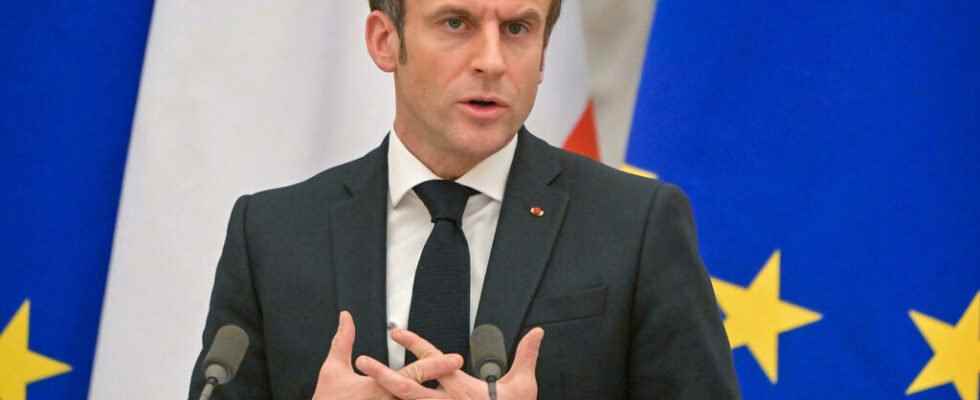Emmanuel Macron arrived in Berlin on Tuesday February 8 for talks with Olaf Scholz, after having held consultations in Moscow and Kiev, aimed at resolving the Russian-Western crisis around Ukraine.
The working dinner in Berlin on Tuesday evening was the last stop on Emmanuel Macron’s diplomatic tour.
The latter chained a long face-to-face with Vladimir Putin on Monday, then with Volodymyr Zelensky, the Ukrainian president, on Tuesday, in search of a diplomatic solution in a context of tensions of a level rarely reached since the end of the Cold War.
After Moscow, then Kiev, French President Emmanuel Macron therefore stopped in Germany on Tuesday evening. There he met Olaf Scholz and Polish President Andrzej Duda. ” Avoid a war in Europe “: France, Germany and Poland have thus displayed their common objective and their unity.
Emmanuel Macron claims to see ” concrete solutions to the Russian-Western crisis linked to Ukraine. He argued in favor of of a demanding dialogue with Russia “, because it is ” the only path that will make peace in Ukraine possible “. Short statements before the meeting.
The three countries are United “to preserve peace in Europe” through diplomacy and through clear messages, as well as the common will to act together “Assured German Chancellor Olaf Scholz. Polish President Andrzej Duda said he believed it was possible ” to avoid war “.
Olaf Scholz tries to reassure his allies
The German Chancellor, who was in Washington on Monday for his first interview with Joe Bidenand which is due to receive the leaders of the Baltic countries this Wednesday, is criticized by some of its allies for its wait-and-see attitude and what appears to be hesitation in the face of Russia. German diplomacy must now give pledges to reassure its allies who no longer hide their concern.
Berlin’s attitude towards Moscow has in fact been causing concern for weeks, starting with the countries that would be on the front line in the event of a conflict with Russia, namely Poland, Ukraine and the baltic countries.
In question more precisely: hesitant declarations on the future of Nord Stream 2the gas pipeline that is to link Russia to Germany, then the refusal to deliver arms to Ukraine, and finally a general impression, which contrasts with the alarmism of the United States and the activity deployed over the past fortnight by French diplomacy.
The trouble is such that in Washington, the German ambassador expressed concern in a dispatch revealed by the German press. As explained Daniel Vallotof RFI’s international service, Berlin would now be considered a partner “ unreliable in the United States, according to the diplomat.
Aware of these criticisms, Angela Merkel’s successor is trying to reverse the trend. Olaf Scholz wants to give pledges to his allies and it is for this reason that he announced this weekend the dispatch of additional troops to Lithuania, and that he multiplies the meetings before flying away too Kyiv and Moscow next week.
Progress made according to Emmanuel Macron
Monday in Moscow, Emmanuel Macron had already come to seek the ways of de-escalation, after his meeting with the Ukrainian president in Kiev on Tuesday, he wanted to show that he was not returning empty-handed. ” On the more military and security issue, we spoke with President Putin on Monday and he told me that he would not be at the origin of an escalation “, specified Emmanuel Macron.
An encouraging commitment for the French president, who has reminded us several times over the past two days that the crisis could not be resolved in a few hours of discussion, but that it would take weeks, even months, because of the deep disagreements, particularly around of the question of NATO and the existing tensions. But Emmanuel Macron felt that progress had been made.
” The discussions that I was able to have with President Putin and President Zelensky made it possible to progress on the ways and means of building this security and stability in the region, explained the French president on Tuesday. I was able, during these exchanges, to obtain the very clear and explicit commitment of Presidents Putin and Zelensky to commit themselves on the strict basis of the Minsk agreements. And I think for my part that indeed this exchange makes possible a meeting in the coming weeks. »
Implementing the Minsk agreements
The solution to the Ukrainian crisis can only be political, within the framework of the Minsk agreements and on the basis of the Normandy format, Emmanuel Macron also estimated on Monday during his visit to the Kremlin.
” France is determined to tirelessly pursue its mediation efforts between Russia and Ukraine to end the conflict. We had the opportunity together, with President Putin and then Chancellor Merkel, to hold what was the last meeting in the so-called Normandy format in Paris in December 2019. The four Heads of Government and State of Normandy format had managed to agree on immediate measures to be implemented, particularly in the humanitarian field. »
On January 26, the four countries reaffirmed their commitment to implementing the Minsk agreements, which are intended to restore Ukraine’s territorial integrity and which paves the way to peace, said the French president: ” On Monday, with President Putin, I discussed this subject at length and he himself recommitted to respecting the Minsk agreements. »
Volodymyr Zelensky therefore considered that a meeting of the “leaders” of the four countries of the Normandy format was possible. A sign of good will, but which remains to be concretized, analyzes our special correspondent, Valerie Gas.
►To read: On the Russian-Ukrainian border, for the inhabitants, “it is not imaginable that there is a war”
(and with AFP)
